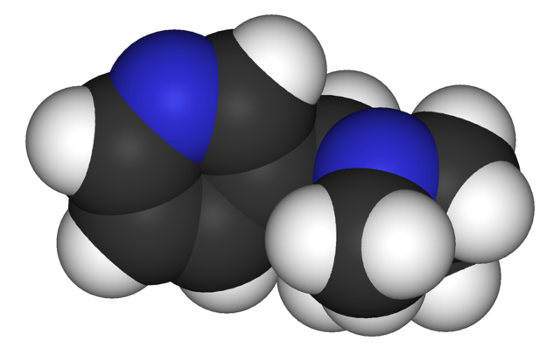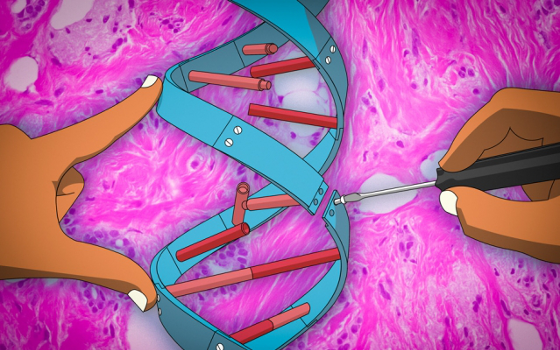Parkinson's disease protection may begin in the gut
- Details
- Category: Research
Your gut may play a pivotal role in preventing the onset of Parkinson’s disease. And the reason may be its knack for sleuthing. Researchers at the University of Iowa have found that the gut may be key to preventing Parkinson's disease. Cells located in the intestine spark an immune response that protects nerve cells, or neurons, against damage connected with Parkinson's disease.
Drug restores hair growth in patients with alopecia areata
- Details
- Category: Research
Seventy-five percent of patients with moderate to severe alopecia areata - an autoimmune disease that causes patchy and, less frequently, total hair loss - had significant hair regrowth after treatment with ruxolitinib, reported researchers from Columbia University Medical Center (CUMC). By the end of treatment, average hair regrowth among the patients was 92 percent. Findings from an open-label clinical trial of 12 patients with alopecia areata were published in the Journal of Clinical Investigation/Insight,

Can nicotine protect the aging brain?
- Details
- Category: Research
Everyone knows that tobacco products are bad for your health, and even the new e-cigarettes may have harmful toxins. However, according to research at Texas A&M, it turns out the nicotine itself - when given independently from tobacco - could help protect the brain as it ages, and even ward off Parkinson's or Alzheimer's disease. Ursula Winzer-Serhan, PhD, an associate professor at the Texas A&M College of Medicine, and her collaborators found that nicotine's ability to be neuroprotective may be partly due to its well-known ability to suppress the appetite.
Historical analysis examines sugar industry role in heart disease research
- Details
- Category: Research
Using archival documents, a new report published online by JAMA Internal Medicine examines the sugar industry's role in coronary heart disease research and suggests the industry sponsored research to influence the scientific debate to cast doubt on the hazards of sugar and to promote dietary fat as the culprit in heart disease. Stanton A. Glantz, Ph.D., of the University of California, San Francisco, and coauthors examined internal documents from the Sugar Research Foundation (SRF), which later evolved into the Sugar Association, historical reports and other material to create a chronological case study.

Gene therapy technique may help prevent cancer metastasis
- Details
- Category: Research
The spread of malignant cells around the body, known as metastasis, is the leading cause of mortality in women with breast cancer. Now, a new gene therapy technique being developed by researchers at MIT is showing promise as a way to prevent breast cancer tumors from metastasizing. The treatment, described in a paper published today in the journal Nature Communications, uses microRNAs - small noncoding RNA molecules that regulate gene expression - to control metastasis.
Review article takes rare look at impact of advertising psychiatric drugs
- Details
- Category: Research
Advertising prescription drugs to consumers is forbidden in most of the world, but since U.S. guidelines were relaxed in 1997, such ads have become nearly ubiquitous in American media. In a newly published review, Brown University researchers examined what has been learned since then about the effect of all that advertising on psychiatric conditions. They found that the data are very limited, but what does exist suggests that ads succeed in driving prescribing with potentially mixed effects on patient care.
Special T cells that target solid tumors offer potential treatment for pediatric and adult cancer
- Details
- Category: Research
Adoptive cell-therapies, in which a patient's own immune cells are used to recognize and target tumors, have shown breakthrough results for patients with certain B-cell malignancies, or cancers of the blood, but this therapy has not seen similar success in patients with solid tumors. Researchers at Baylor College of Medicine and Texas Children's Cancer Center are working to change that, and a new study has shown promising results for several pediatric and adult solid tumor cancers.
More Pharma News ...
- Many adults who screen positive for depression don't receive treatment
- Chemists make strides to simplify drug design and synthesis
- Meditation, yoga and vegetarian diet linked to decline in plasma metabolites associated with inflammation and cardiovascular disease risk
- Nano-lipid particles from edible ginger could improve drug delivery for colon cancer
- Study shows how Chinese medicine kills cancer cells
- Experimental drug could stop melanoma, other cancers, research suggests
- Researchers eyeing first new anti-hypertensive drug treatment strategy in more than 15 years